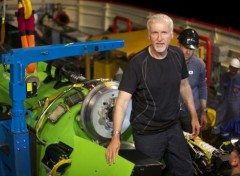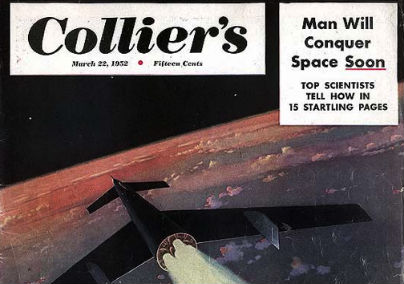
io9 has the story about Cameron’s complaint and his endeavor to spearhead a return to “Challenger Deep, the deepest known point in all the world’s oceans.”
I just want to highlight a pleasantly surprising remark from Cameron:
“I think we’ve got to do better,” he told Nature News. “If it means getting private individuals together with institutions and bypassing the whole government paradigm, that’s fine. Maybe that’s what we need to do.”
Please, by all means, do.
[continue reading…]
Help Promote Prometheus Unbound by Sharing this Post


A physicist by training and an economist by vocation, David Friedman, son of famed economist Milton Friedman, is best known in libertarian circles as the author of The Machinery of Freedom, a utilitarian case for anarcho-capitalism.
But David Friedman has also written two fantasy novels: Harald and Salamander. Recently, in two blogposts, he discussed the economics and physics in his fiction. Update: There is a third post on related matters (military logistics) in Harald; be sure to peruse the comments on this one.
In the first post, Friedman references a blogpost by an economist working at the New Zealand Institute of Economic Research about his realization that “Sci-fi needs economists.”1 He can take heart, perhaps, that science fiction authors are becoming more economically literate (or so Gregory Benford believes).
Reading Friedman’s posts reminded me of some things I read and listened to from L.E. Modesitt, Jr., a while back. A professional economist before becoming a full-time science fiction and fantasy author, Modesitt has also discussed how he incorporates the economic point of view into his work (see The Magic of Recluse, for starters) as well as the importance of understanding economics in order to write practical fantasy:
[continue reading…]
Help Promote Prometheus Unbound by Sharing this Post


There’s an article by science fiction author Gregory Benford in the February issue of Reason Magazine (also available online at Reason.com). I hadn’t realized it, but Benford has written three other articles for Reason (see below for a list of the others).
In the article, Benford briefly discusses the role of Nazi SS officer and rocket scientist Wernher von Braun 1 in the American government’s space program, from his popular promotion of his vision of man conquering space (interesting choice of war metaphor) to his running the Apollo program.
Benford discusses Von Braun’s vision for how man will conquer space, a vision that strikes me as impractical and expensive and that still lingers in NASA today. He also highlights the decline of NASA and its “ruinously expensive” nature of the American government’s space shuttle program, which suffered catastrophic failures and kept going long past its planned obsolescence.
Though Benford says that Von Braun’s vision lives on, I’m not so sure of that. If he means Von Braun’s general vision of man “conquering” space, then yes, that vision is not dead. If he means Von Braun’s more specific vision of how this is to be accomplished, then no, I do not think that vision will live on.
[continue reading…]
Help Promote Prometheus Unbound by Sharing this Post

A revised vision of basic cell biology
Science fiction blends science and story, but stories and images are among the building blocks of science itself to a greater extent than most people realize. The most engaging science books tackle the narratives that scientists believe and on which they base study designs and interpretations. Cells, Gels, and the Engines of Life provides a detailed case study of how such scientific stories and simple mental images operate to guide entire fields over decades – and not always along the best available paths.
With everything from bio-engineering to bio-hazards of keen interest in the popular and science-fictional imaginations, it is important to be clear on the fundamentals of how cells work. We might have thought we already knew, but this book questions a whole list of “textbook” fundamentals and offers an alternative, integrated framework for explaining a wide range of cell functions.
Once a misguided view has been established in any field, not only in economics, but apparently also even fields such as cell biology with relatively few obvious sources of political distortion, it can take a rare blend of courage, expertise, and clarity to budge things in a new direction. This can emerge not only in the storied times of Copernicus, Kepler and Galileo, but even today. It still takes a heroic protagonist to put it all together and say it out loud against layers of convention. Meet Dr. Gerald H. Pollack, the author, professor of bioengineering at the University of Washington.
A master class in scientific thinking
Anyone with a firm reading ability can delve into this book and might be surprised, given the school-inflicted association of basic science instruction with soporific textbooks, to be sucked in on the first page. This is much more than a book about how cells work; it is a master class in fresh and precise scientific thinking, an art much in need of renaissance in an age of truth by click-through count, research-grant total, and mere widespread assertion.
[continue reading…]
Help Promote Prometheus Unbound by Sharing this Post

 J. Edgar, the new film directed by Clint Eastwood and starring Leonardo DiCaprio, is making the news for dealing frankly with the decades old rumors concerning Hoover’s private life. But that’s not what makes the film immensely valuable. Its finest contributions are its portrait of the psycho-pathologies of the powerful and its chronicle of the step-by-step rise of the American police state from the interwar years through the first Nixon term.
J. Edgar, the new film directed by Clint Eastwood and starring Leonardo DiCaprio, is making the news for dealing frankly with the decades old rumors concerning Hoover’s private life. But that’s not what makes the film immensely valuable. Its finest contributions are its portrait of the psycho-pathologies of the powerful and its chronicle of the step-by-step rise of the American police state from the interwar years through the first Nixon term.
The current generation might imagine that the egregious overreaching of the state in the name of security is something new, perhaps beginning after 9/11. The film shows that the roots stretch back to 1919, with Hoover’s position at the Justice Department’s Bureau of Investigation under attorney general A. Mitchell Palmer. Here we see the onset of the preconditions that made possible the American leviathan.
Palmer had been personally targeted in a series of bomb attacks launched by communist-anarchists who were pursuing vendettas for the government’s treatment of political dissidents during the first world war. These bombings unleashed the first great “red scare” in American history and furnished the pretext for a gigantic increase in federal power in the name of providing security. In a nationwide sweep, more than 60,000 people were targeted, 10,000 arrested, 3,500 were detained, and 556 people were deported. The Washington Post editorial page approved: “There is no time to waste on hairsplitting over infringement of liberties.”
Here we have the model for how the government grows. The government stirs up some extremists, who then respond, thereby providing the excuse the government needs for more gaining more power over everyone’s lives. The people in power use the language of security but what’s really going on here is all about the power, prestige, and ultimate safety of the governing elite, who rightly assume that they are ones in the cross hairs. Meanwhile, in the culture of fear that grips the country – fear of both public and private violence – official organs of opinion feel compelled to go along, while most everyone else remains quiet and lets it all happen.
The remarkable thing about the life of Hoover is his longevity in power at every step of the way. With every new frenzy, every shift in the political wind, every new high profile case, he was able to use the events of the day to successfully argue for eliminating the traditional limits on federal police power. One by one the limitations fell, allowing him to build his empire of spying, intimidation, and violence, regardless of who happened to be the president at the time.
[continue reading…]
Help Promote Prometheus Unbound by Sharing this Post
In my last news roundup, I briefly discussed the Encyclopedia of Science Fiction being put online for free by Gollancz. At the time, I speculated: “Why [put it online for free]? Oh, I don’t know, maybe reading through the encyclopedia will tempt people into buying more books and ebooks of and about the stories and authors described within it.” This was before I had heard about Gollancz’s new SF Gateway imprint.
SF Gateway will be publishing online in ebook form a catalog numbering in the thousands of out-of-print backlist books from its authors. Including “the classic SF pulp writers of the Golden Age right through to modern award-winning authors,” SF Gateway purports to be “the largest library of digital Science Fiction and Fantasy ever assembled.” All of these titles will naturally be directly interlinked with author and title entries in the Encyclopedia of Science Fiction, so the encyclopedia will serve as a handy way to spur sales. The SF Gateway site will also serve in part as a social network, which is another clever idea — build up an online community around the encyclopedia and that large library of sf&f ebooks. You can read more about it in the pdf press release.
Also in the last news roundup, I mentioned some innovations in publishing. Here is some more info on a couple of them:
[continue reading…]
Help Promote Prometheus Unbound by Sharing this Post

Dr. Uchronia
The history that didn’t happen can be just as interesting as the history that did.
This article is a small example of its own topic. Except by chance, I wouldn’t now be writing it. Not finding what I wanted while browsing in our library’s magazine aisles, I came across mention of “uchronie” in Le Nouvel Observateur. The philosopher Charles Renouvier chose this word as the title of his novel of 1857 and 1876; he coined it from Greek roots meaning “no time.” He was following the pattern set by St. Thomas More, whose Utopia derives from roots meaning “no place.” Utopia is a place that does not exist; uchronia is a time that did not exist. Uchronian works — to introduce the English adjective — are also called “what-if,” alternative, conjectural, or counterfactual history. They consider what would have happened if something else had chanced to happen.
Such works fall into two categories. The distinction is fuzzy but useful. Writings of the first kind, unlike actual history or a standard historical novel, are sheer fiction. They are not speculations about real events; they are stories that stand on their own. The Star Wars movies and Tolkien’s tales are good examples. Another is Islandia, a novel by Austin Tappan Wright, published posthumously in 1942. Wright describes events and personalities in a country on a fictional continent in the Southern Hemisphere before World War I. The people of Islandia, while highly civilized and advanced in philosophy and psychology, prefer their old ways, rejecting railroads and most other modern technology and narrowly limiting contact with the outside world. The reader (this one, anyway) drifts with the author into sympathy with the Islandian way of thinking.
Edward Bellamy’s Looking Backward (1887) projects an opposite vision, one intended as backward only in an ironic sense; it imagines a prosperous and happy socialist utopia of 2000. This uchronia actually exerted some influence in its time, converting many readers to socialism because they wanted to live in the world of Bellamy’s vision.
[continue reading…]
Help Promote Prometheus Unbound by Sharing this Post
















